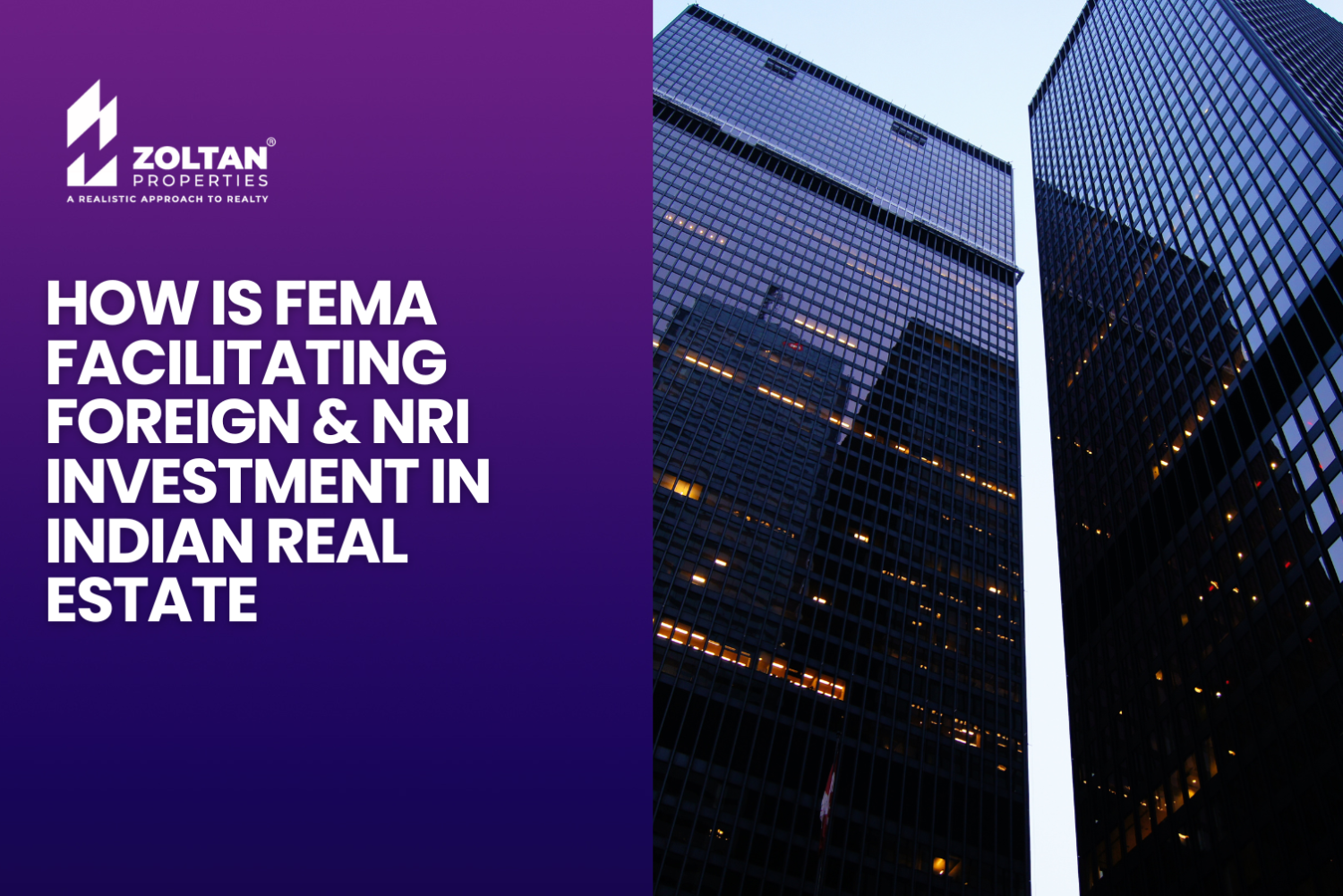Foreign and Non-Resident Indian (NRI) investment plays a significant role in the growth and development of the real estate sector in India. While FEMA (Foreign Exchange Management Act) primarily governs foreign exchange transactions, it indirectly facilitates the attraction of foreign and NRI investment in real estate.
This blog will explore how FEMA, along with other government initiatives, fosters an environment conducive to international investment in the Indian real estate market.
What is FEMA?
Foreign Exchange Management Act of India, which is an Act of the Parliament of India that regulates foreign exchange transactions in India. FEMA was enacted in 1999 to replace the Foreign Exchange Regulation Act (FERA) of 1973, which was more stringent and restrictive. FEMA aims to facilitate external trade and payments and promote the orderly development and maintenance of the foreign exchange market in India. FEMA is a regulatory mechanism that enables the Reserve Bank of India (RBI) to pass regulations and the Central Government to pass rules relating to foreign exchange in tune with the Foreign Trade policy of India.
FEMA applies to all parts of India and also to all branches, offices, and agencies outside India owned or controlled by a person resident in India. FEMA covers all aspects of foreign exchange, such as current account transactions, capital account transactions, foreign direct investment, external commercial borrowings, export and import of currency, etc. FEMA also provides for penalties and enforcement actions for violations of its provisions.
How is FEMA attracting foreign investment?
Liberalized Regulations: FEMA has played a pivotal role in liberalizing regulations and simplifying procedures to encourage foreign and NRI investment in Indian real estate. Over the years, the Indian government has relaxed norms and increased the permissible limits for investments, making it more attractive for international investors to participate in the sector.
Foreign Direct Investment (FDI) Policy: Under the FDI policy, the government has progressively relaxed restrictions on foreign investment in the construction development sector. FEMA ensures compliance with FDI norms and regulates the inflow of foreign investment into the real estate sector. The policy allows for 100% FDI in specific project types such as townships, housing, and infrastructure development, subject to certain conditions.
Real Estate Investment Trusts (REITs): FEMA indirectly supports foreign and NRI investment through the introduction of Real Estate Investment Trusts (REITs). REITs provide an avenue for investors to invest in income-generating real estate assets, such as commercial properties and infrastructure projects. By investing in REITs, foreign and NRI investors can participate in the Indian real estate market while enjoying the benefits of portfolio diversification and regular income distribution.
Repatriation of Funds: FEMA ensures that foreign investors and NRIs can easily repatriate funds invested in Indian real estate. It provides guidelines and regulations regarding the repatriation of capital, rental income, and profits earned from the sale of a property. These provisions give investors confidence in the ease of remitting funds back to their home countries, reducing concerns about capital lock-in.
Single Window Clearance: To attract foreign and NRI investors, the Indian government has implemented a single window clearance mechanism for real estate projects. This streamlined process reduces bureaucratic hurdles and enhances transparency, making it easier for international investors to navigate the regulatory landscape and undertake projects in India.
Initiatives to Improve Infrastructure: FEMA collaborates with various government bodies to facilitate infrastructure development and improve the overall investment climate in the real estate sector. Efforts to enhance connectivity, develop smart cities, and build supportive infrastructure not only attract foreign and NRI investment but also contribute to the growth and sustainability of the real estate market in India.
Benefits of FEMA for NRIs Investing in Indian real estate
Some of the benefits of FEMA for NRIs investing in Indian real estate are:
FEMA permits NRIs to repatriate the sale proceeds of immovable property acquired in India to the extent of the amount paid for acquisition in foreign exchange. The repatriation is subject to certain conditions such as payment of taxes, completion of the minimum lock-in period, etc.
FEMA enables NRIs to avail of loans from authorized dealers or housing finance institutions in India for buying immovable property in India, subject to certain terms and conditions prescribed by the RBI. The loan amount cannot exceed 80% of the value of the property and loan repayment can be made by debiting NRE/ FCNR/ NRO accounts or by remitting funds from abroad.
FEMA does not impose any cap on the number of residential or commercial properties that an NRI can acquire in India, as long as they are not agricultural land, plantation, or farmhouse.
Conditions for NRIs to avail of loan in India
Some of the conditions and limits for availing loans for NRIs are:
The loan eligibility may depend on various factors such as income, age, work experience, credit score, and repayment capacity of the NRI. The minimum income requirement may vary from Rs. 25,000 to Rs. 50,000 per month depending on the lender and the loan amount.
Conclusion
FEMA, along with supportive government policies, has played a crucial role in attracting foreign and NRI investment in the Indian real estate sector. These measures have helped India become an attractive destination for foreign and NRI investors seeking opportunities in the rapidly evolving real estate market.
If you’re an NRI or foreigner and want to invest in fast-growing Indian Real Estate, Zoltan Properties has brought you the most promising projects from the most premium locations in the country.
Whether you’re looking to invest in commercial property in India or Residential Real Estate, we’ve got everything covered. Just visit https://www.zoltanproperties.com/properties/all

 IN
IN
 France
France
 Germany
Germany
 Greece
Greece
 India
India
 Saudi Arabia
Saudi Arabia
 Spain
Spain
 United Arab Emirates
United Arab Emirates
 United Kingdom
United Kingdom
 United States
United States






